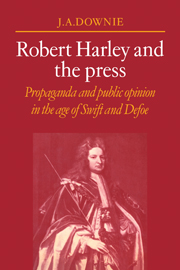Book contents
- Frontmatter
- Contents
- Preface and Acknowledgements
- Author's note
- Introduction
- Part one 1689–1708
- Part two 1708–1714
- 5 The tory resurrection, 1708–1710
- 6 Swift, Defoe, and the peace campaign
- 7 The stamp act of 1712
- 8 The organisation of propaganda, 1710–1714
- Epilogue: impeachment and after
- Abbreviations
- Notes
- Index
5 - The tory resurrection, 1708–1710
Published online by Cambridge University Press: 07 October 2011
- Frontmatter
- Contents
- Preface and Acknowledgements
- Author's note
- Introduction
- Part one 1689–1708
- Part two 1708–1714
- 5 The tory resurrection, 1708–1710
- 6 Swift, Defoe, and the peace campaign
- 7 The stamp act of 1712
- 8 The organisation of propaganda, 1710–1714
- Epilogue: impeachment and after
- Abbreviations
- Notes
- Index
Summary
Harley was thrown very much back on his own resources on his fall from office in February 1708. Defoe continued to write for the reformed Godolphin ministry. Toland had proved undependable. Harley had arranged for him to be sent on a government mission to Germany. Tutchin had died after a severe beating in the autumn of 1707. Davenant was too much of a courtier, and Harley had alienated other potential High Church apologists. No-one defended him from the scurrilous lampoons that proliferated on his fall, lauding him with epithets such as Harlequin le Grand and the Welsh-Monster. His reaction to the situation illustrates the importance he placed on printed propaganda. His first move was to retire to his estate in the country, where he remained until November 1708. There he licked his wounds, reviewed the state of political affairs, and began to plan the overthrow of the ‘family’ – his collective term for the Marlboroughs and their supplicants. In the course of the summer months he initiated correspondence with leading tories in the Commons through the offices of his friend William Stratford. In particular, he forged an alliance with William Bromley, opposition candidate for the speakership. Henry St John recognised that Bromley was the linchpin of the rapprochement between Harley and the tackers. ‘You broke the party, unite it again, their sufferings have made them wise’, St John advised Harley, ‘There is no hope I am fully convinced but in the Church of England party, nor in that neither on the foot it now stands, and without more confidence than is yet re-established between them and us’.
- Type
- Chapter
- Information
- Robert Harley and the PressPropaganda and Public Opinion in the Age of Swift and Defoe, pp. 103 - 130Publisher: Cambridge University PressPrint publication year: 1979



